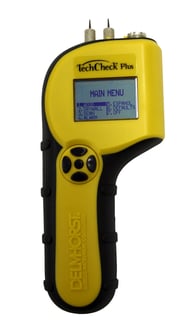Balancing Cost, Convenience, and Function for Moisture Meters

Shopping for the right precision tool can be a Zen-like experience for some, and a constant source of frustration for others. This is as true of moisture meters as it is for other precision tools.
Whether you love to browse all of the different tools on the market or you hate the hassle of dealing with it all, there are still three key factors you’ll have to balance:
- Cost;
- Convenience; and
- Functionality.
It can be difficult to find a moisture meter that’s a perfect balance of all three. Meters that have a lot of functions are often clunky, hard-to-use, and expensive. Cheap meters may break easily and/or lack the specific functions you need for your work.
So, how can you balance cost, convenience, and functionality to find the perfect moisture meter to fit your needs?
Start with the Functionality You Need
Before considering cost and convenience, start with what functions your moisture meters absolutely need to have for your work. This includes things such as what kind of reading scales the meter uses, level of accuracy, and moisture range that you require.
For example, a water damage restoration expert may need a meter with both wood and drywall reading scales because they work with different kinds of building materials. On the other hand, a wood manufacturer may need a meter with insulated pins to make comparisons of shell and core moisture in kiln-dried wood.
By starting with defining the most important functionalities & features you need to do your best work, you can help narrow down your choices.
Consider the Convenience Factors Next
 Once you know which meters have your bare minimum required functions, consider which ones would have the biggest impact on your “quality of life” on the job.
Once you know which meters have your bare minimum required functions, consider which ones would have the biggest impact on your “quality of life” on the job.
For example, functions such as the ability to store and export moisture readings to your computer can make it much easier to document your work. Other features, such as 2-in 1 functionality for pin and pinless moisture measurement modes, can save room on the tool belt and time switching between two tools.
Digital displays are generally easier to read than analog ones, removing some of the ambiguity from your moisture measurements.
Convenience goes beyond meter functionalities and features. It’s also important to look at things like the manufacturer’s return and warranty policies, as well as their customer support. Some manufacturers provide online help manuals and tutorials that can make a moisture meter much easier to use.
Considering Cost
In a perfect world, we would all have the budget to buy top-of-the-line, premium precision tools for all of our workers. Unfortunately, not everyone has unlimited resources for making a moisture meter purchase.
Yet, there’s more to the cost of a moisture meter than the price tag on the day of purchase. It’s also important to consider the total cost of ownership for each moisture meter you acquire.
For example, say that you buy a cheap moisture meter for $50 with a 30-day warranty and it works for 60 days before breaking or becoming too inaccurate to provide reliable moisture measurements. At this rate, your total cost of ownership for this meter would be about $304 per year (365/60=6.083, 6.083*50=304.16) because you’d have to replace the “cheap” meter every 60 days.
Now, if you spent $300 on a higher-quality meter that lasted for just two years, your total cost of ownership for that meter would be $150 a year, less than that of the “cheaper” meter for a year (365/730=0.5, 0.5*300=150). And most high-quality moisture meters last for many years, further reducing the cost of ownership.
This doesn’t take into consideration the productivity and time-saving benefits that using a higher-quality meter with better features and functions could provide. Add those figures into the calculation, and the cost of ownership gap could grow exponentially.
How can you tell if a moisture meter is likely to last long enough to keep your total cost of ownership down? One way is to look at the manufacturer’s warranty. A strong warranty shows the manufacturer’s confidence in the quality and durability of their product.
Another way is to check with other users of a particular moisture meter manufacturer’s products to see what they have to say—this can also give you an idea of how convenient the moisture meter is.
By carefully considering convenience, functionality, and total cost of ownership, you can find the perfect moisture meter for your needs. Of course, choosing a trusted moisture meter manufacturer who manufactures all of their tools in the USA to verifiable standards can help narrow down your search considerably.
Subscribe to Our Blog
Post Related

Comparing 4 High-End Grain Moisture Meters


